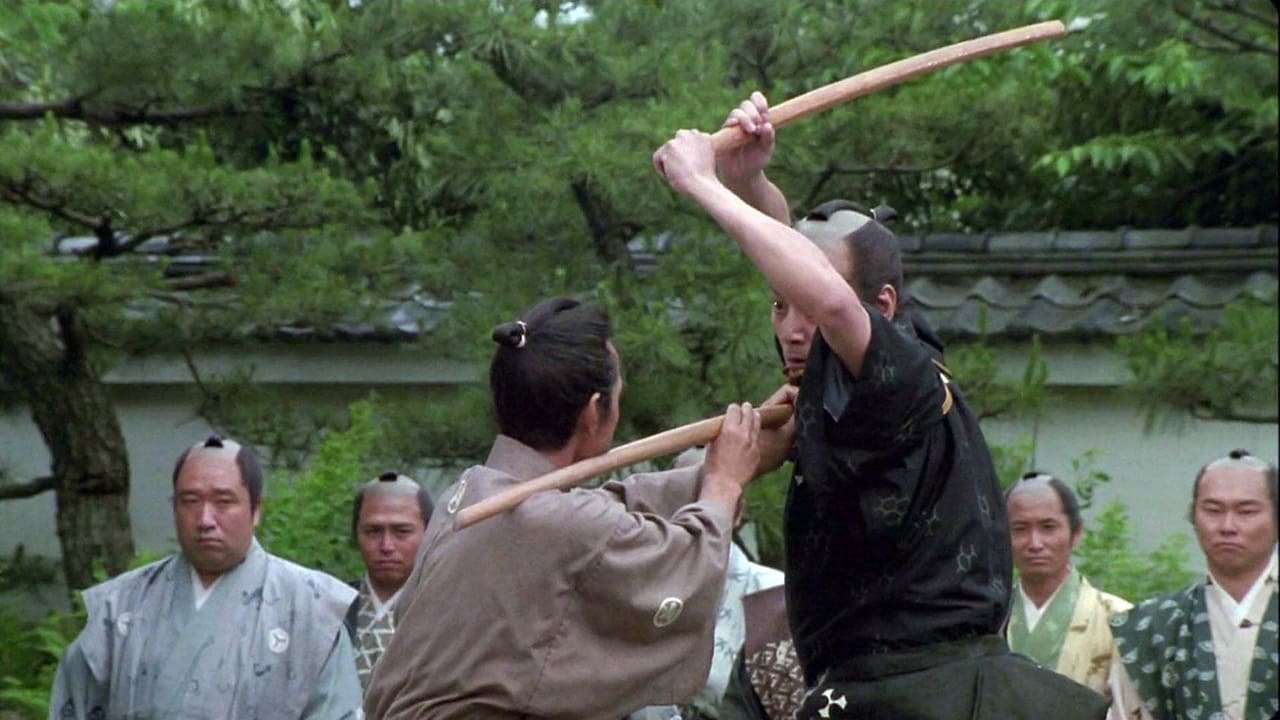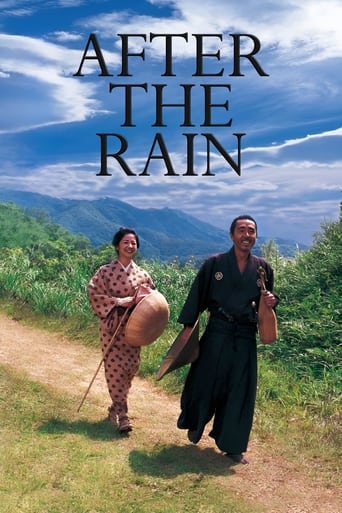NekoHomey
Purely Joyful Movie!
SnoReptilePlenty
Memorable, crazy movie
Sameer Callahan
It really made me laugh, but for some moments I was tearing up because I could relate so much.
Delight
Yes, absolutely, there is fun to be had, as well as many, many things to go boom, all amid an atmospheric urban jungle.
Mateus Pimentel
This movie is great for people who like movies about Japanese samurai. Despite not having much action, it is an engaging film that holds the attention of the viewer. The story is simple and focuses primarily on the main character. The few fights that are shown have a very good choreography. The acting is decent and the cinematography is one of the strengths. Throughout the film we are blessed with beautiful nature landscapes.The film has the ideal running time. Even being a little slow sometimes it does not become boring.7/10
Corvus A
This film is remarkable for two reasons. It is a study of Japanese culture, and it is a parable about the human spirit.Although Kurosawa did not direct this, he wrote the screenplay, and his assistant of many years did direct it. It is, however, typical Kurosawa brilliance. As in the Seven Samurai, Kurosawa gently reveals life vignettes of both the common man, ronin, and samurai class people. The care for the common man that Kurosawa shows us has always reminded me of Chaucer. We do not often get to see accurate and non-judgmental portraits of the masses of people whose names never get recorded in history. He also accurately counterpoints, his depiction of the lower classes with vignettes from upper class life and decision-making.The story itself is simple, but highly enjoyable. The dueling scenes are excellently done, although they lack some of the clash and dash dramatics of typical sword fights from any genre - Western or Eastern. They do appear more realistic. But, the real story is in the people. This is a window to Japanese culture for outsiders, and a window to Japanese historical culture for the Japanese. There are many satisfying moments: the party at the inn, the bokken duels, the duel in the forest, the moment the lord achieves insight into our hero's motivation, and the moment our hero's wife speaks out; all stood out in my mind. As the characters develop, the conflict we see arise is because our hero is a man who is humble. He is a samurai/Buddhist ideal character, in both his ability, and his humility about it. But he is not a stereotype - he is a very real depiction of the kind of motivation and character you would expect from a person who was slightly outside the normal cultural system of Japan at the time. Kurosawa also examined similar characters and motivation in the Seven Samurai (especially the clown, Mifune's character).The ending is unresolved, probably to get one to think about the characters actions as the movie ends - the ideal, humble man finding internal happiness, opposed to the typical, driven-to-succeed type who is endlessly chasing his goal.
Patryk Czekaj
After the Rain is an endearing, exceptionally tranquil yet expressive samurai film based on a short story by Shūgorō Yamamoto. Akira Kurosawa, who wasn't able to finish the project due to a sudden death, wrote the script and was right in the middle of the production phase. Takashi Koizumi – one of Kurosawa's most prominent partners in the filmmaking business – promised to finish what his mentor has started. Looking at the final result it's perfectly safe to say that After the Rain is a mightily climatic and genuinely enthralling homage to the late director's unforgettable works. All it takes is just five minutes, and I'm sure that one won't be able to overlook many of the resemblances that emerge from the screen. As silly as it may sound, After the Rain looks at times as though Kurosawa directed it from beyond the grave.The film, set in the Edo period, follow closely the adventures of a traveling ronin Ihei Misawa (Akira Terao). He has all the attributes of a true samurai, yet there's something very different about him. Namely, he stands out from the crowd of many anonymous sword-carrying warriors due to his overly joyful and helpful attitude towards those in need. During a heavy rain that floods the only way across the river, Ihei – wearing an enormously friendly smile – decides to invite all the locals, taking shelter in a nearby hotel, to a huge feast. Through his good deeds, unselfish behavior, and most-positive nature he quickly becomes a hero of sort for all the guests. When the rain stops and Ihei is finally able to roam further, he encounters a bunch of up-to-no-good swordsmen. Stopping the probably deadly fight and winning the approval of a passing officer leads to a surprising invitation from a local lord, Shigeki (a showy and exuberant yet graceful performance by Shiro Mifune, Toshiro Mifune's son). During their first meeting in the palace, Ihei reveals how – thanks to a most clever and fanciful plan – he got a hold of a huge amount of money: on his way to Edo (old Tokyo) the lone samurai visited many of the region's dojos and tricked their masters into payment by way of premature surrender.Impressed and jubilant Shigeki decides to name him the Master-of-Arms of the fief. However, the decision meets with fierce criticism coming from the side of a resentful group of masters, whom Ihei previously ridiculed. Put to an ultimate test, the ronin is forced to pass the traditional demonstration, in which he needs to beat every opponent willing to prevent him from getting the respectable title. Everything goes smoothly until the moment when Shigeki himself challenges Ihei to a duel. Defeated and insulted, the lord's anger is indescribable, and soon he chooses to change his decision, making Ihei jobless once again. What's more, on his way back home the lone samurai is forced to fight a group of the aforementioned angry masters, in the film's only truly bloody scene.After the Rain is a particularly feel-good samurai picture, which shows a very interesting insight into the protagonist's rich life, his relationship with a vulnerable yet loving wife (Yoshiko Miyazaki), and – at the same time – proves to be a fascinating lesson about the culture and customs that ruled Japan more than 200 years ago. Moreover, by cutting the movie abruptly without a certain finale Koizumi only increases the viewer's curiosity and anxiety concerning Ihei's unknown fate. Looking at After the Rain as a whole, I'm really convinced that Akira Kurosawa would've been proud of this picture.
ollie-2
Director Takashi Koizumi made a beautiful movie in the best Kurosawa tradition, about the relationship between a samurai and his surroundings. These surroundings are both in the personal sphere and in the natural sphere. The story quietly unfolds, about this particular samurai and his wife, temporarily staying in a tavern because of the ever falling rain. He teaches the folks in the tavern how to enjoy life. Then he gets an offer from a Lord to become a teacher at the court in swordfighting. But other swordteachers conspire against him and he doesn't get the job. The result is that his wife understands him better and after the rain has stopped, they travel on as a very happy couple through and in harmony with the beautiful countryside. This movie teaches us about simplicity and about being pleased with the things around oneself.

